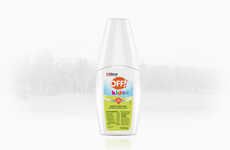
Ed Rosenthal's Zero Tolerance Pesticide is Powered by Natural Oils
Laura McQuarrie — March 8, 2016 — Eco
References: z-tolerance & coloradogrowerssupply
Ed Rosenthal developed his Zero Tolerance Herbal Pesticide as a product with "no weird chemicals" that would be safe enough to use in indoor, greenhouse and garden environments. The product comes in both ready-to-use and concentrate formats, which are made from a base of herbal cinnamon, clove, rosemary and thyme oils. In addition to treating insects, the herbal pesticide is also effective at keeping other pests and mold a bay.
While these natural pesticides are potent enough to handle undesirable spider mites, they evaporate fully, making them safe to use on plants, fruits and vegetables that will be harvested and eaten at home.
In addition to proudly showcasing a OMRI Listed seal, it's also described that "Ed’s Zero Tolerance is 100% Vegan and even smells good."
While these natural pesticides are potent enough to handle undesirable spider mites, they evaporate fully, making them safe to use on plants, fruits and vegetables that will be harvested and eaten at home.
In addition to proudly showcasing a OMRI Listed seal, it's also described that "Ed’s Zero Tolerance is 100% Vegan and even smells good."
Trend Themes
1. Natural Pesticides - The trend of using natural pesticides is disrupting the traditional pesticide industry by offering safe and eco-friendly alternatives.
2. Herbal-based Solutions - The trend of developing herbal-based pesticides presents disruptive innovation opportunities by harnessing the power of natural oils to combat pests and mold.
3. Homegrown Produce Safety - The trend of using herbal garden pesticides focuses on ensuring the safety of homegrown produce, providing an opportunity for innovation in the agricultural sector.
Industry Implications
1. Pesticide Industry - The use of natural and herbal-based pesticides disrupts the traditional pesticide industry, prompting companies to explore safer and environmentally friendly alternatives.
2. Agricultural Industry - The development of herbal garden pesticides offers disruptive innovation opportunities in the agricultural sector, specifically in ensuring the safety and quality of homegrown produce.
3. Greenhouse Industry - The trend of using natural pesticides creates opportunities for disruptive innovation in the greenhouse industry, as it allows for pest control without harmful chemicals to create a healthier growing environment.
3.4
Score
Popularity
Activity
Freshness























